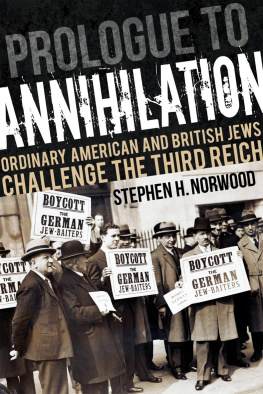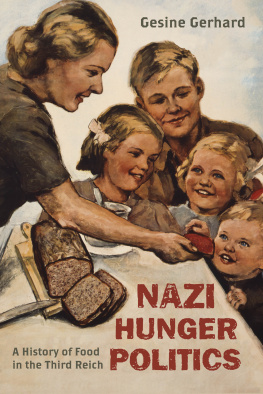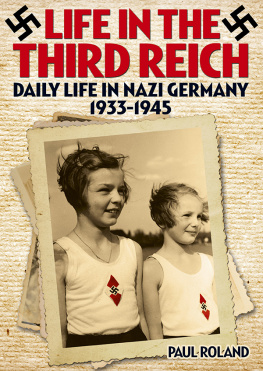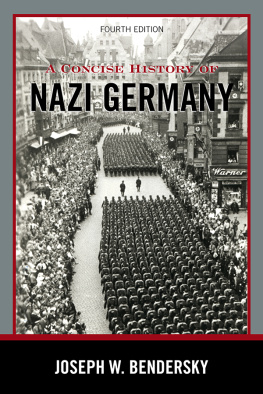EDUCATION IN
NAZI GERMANY
EDUCATION IN
NAZI GERMANY
Lisa Pine

English edition
First published in 2010 by
Berg
Editorial offices:
First Floor, Angel Court, 81 St Clements Street, Oxford OX4 1AW, UK
175 Fifth Avenue, New York, NY 10010, USA
Lisa Pine 2010
All rights reserved.
No part of this publication may be reproduced in any form or by any means without the written permission of Berg.
Berg is the imprint of Oxford International Publishers Ltd.
Library of Congress Cataloging-in-Publication Data
Pine, Lisa.
Education in Nazi Germany / Lisa Pine. English ed.
p. cm.
Includes bibliographical references.
eISBN: 978-1-8478-8764-1
1. EducationGermanyHistory20th century. 2. Education and stateGermanyHistory20th century. 3. EducationPolitical aspectsGermanyHistory20th century. 4. National socialism and educationGermany. 5. National socialism and youthGermany. I. Title.
LA721.8.P56 2010
370.94209043dc22
2010037203
British Library Cataloguing-in-Publication Data
A catalogue record for this book is available from the British Library.
Typeset by JS Typesetting Ltd, Porthcawl, Mid Glamorgan.
Printed in the UK by the MPG Books Group.
www.bergpublishers.com
For my parents
CONTENTS
It is a pleasure to be able to thank the many people who have helped me in the process of researching and writing this book. I am grateful to the staff of the Bundesarchiv in Berlin, the Institut fr Zeitgeschichte in Munich, the Georg Eckert Institute in Brunswick, as well as staff at the British Library, the British Newspaper Library, the Wiener Library and the German Historical Institute in London, for their assistance.
I should like to thank the British Academy for a Small Research Grant awarded to me in 2008 for archival research in Berlin. I am grateful to the SPUR Institute and the Research Opportunities Fund at London South Bank University for their generous funding of my research over the last few years.
I should like to thank my very capable and efficient research assistants, Manuel Siebert, Anna Heizmann and Anna Keller for all their hard work. I am very grateful to Stephanie Salzmann and Ulrich Schlie for their wonderful and kind hospitality in Berlin. I should like to express my appreciation to Hans Hahn and Laurence Marlow for reading the manuscript and suggesting improvements. My thanks are also due to my editor, Julia Hall, for her enthusiasm for the project, her patience and her help, and to my copy-editor, Julene Knox, for her hard work.
My acknowledgements would be incomplete without a note of personal thanks to my wonderful family, who have supported me throughout the writing of this book. My husband, Andrew Fields, who always has faith in my endeavours, and my children, Gabrielle and Sasha Fields, who have consistently encouraged me to write this book and have been very patient in allowing me to do so.
In my great educative work, I am beginning with the young. We older ones are used up. Yes, we are old already. We are rotten to the marrow. We have no unrestrained instincts left. We are bearing the burden of a humiliating past, and have in our blood the dull recollection of serfdom and servility. But my magnificent youngsters! Are there finer ones anywhere in the world? Look at these young men and boys! What material! With them I can make a new world.
Adolf Hitler
The main objective of this book is to provide a re-evaluation of education and the socialization of youth in the Third Reich in the light of new knowledge, theories and debates about the nature of the Nazi state. This will be achieved by analysing three main areas: education policy, the Nazi elite schools and the Nazi youth groups. Education is fundamental to our entire macro-view of the Third Reich, as the process of shaping the minds of the future generation was such a significant aspect of the Nazi regime. This book addresses a number of important questions, many of which have not been adequately treated in the secondary literature on the Third Reich: What were the aims of Nazi education policy? Was the regime successful in achieving these objectives? Who made Nazi education policy? What changes were made to the education system and to the school curriculum? How did the Nazi regime use school textbooks as propaganda instruments? What was the role and significance of the Nazi elite schools in the Third Reich? How was youth socialization achieved in the Nazi youth groups?
The Nazi regime sought to win over young people by means of both the schools and the youth groups. Indeed, some Nazi pedagogues believed that schools should play a secondary role to youth groups. This book links the schools and youth groups together conceptually, demonstrating how the Nazi regime utilized both, in order to achieve a total education of German youth. In particular, the Nazi regime used education and socialization to create identity. Whilst recent works have considered the role played by propaganda, the SS, the Nazi womens organizations and other Party formations in the creation of identity, the part played by schools and youth groups together requires more detailed analysis. Education and socialization in Nazi Germany were fundamental to the shaping and forging of national identity, as well as self-perception and the perception of others. This was bound up with the wider issue of inclusion in and exclusion from the Volksgemeinschaft (national community). Education under National Socialism was directed at creating a new awareness, changing the way people thought and eroding traditional loyalties. Propaganda, underpinned by the threat and use of terror, was another integral part of this process. The Hitler regime employed a combination of policies designed to create consensus, as well as censorship, aiming to ensure that access to other sources of information or ways of thought was unavailable. Hence, the specific area of study of education and youth socialization is central to our understanding of the National Socialist state. The shaping of culture and stamping of identity in line with the Nazi Weltanschauung (world view) and the education and socialization of youth to become the ideal future generation of Germans are fundamental to our wider comprehension of the Third Reich.
The existing literature consists of books that deal with various aspects of education and others that treat the youth groups. The historiography of Nazi education is vast and complex, but much of it also rather dated, having been written between the 1960s and 1980s. Eilers was the pioneer in this field, publishing in 1963 the first post-war account of education under National Socialism.
Recent debates about the nature of National Socialism necessitate a re-examination of a number of angles and perspectives. Firstly, it is important to consider the continuities and discontinuities in education policy between the Kaiserreich (Second German Empire), the Weimar Republic and the Third Reich. In this way, it will become possible to evaluate the extent to which Nazi policy was novel. Education policy in the Kaiserreich was already falling under the influence of a move towards greater militarization and nationalism in society as a whole. It has been suggested that modern Germany took a Sonderweg (special path) in the nineteenth century that distinguished her development from that of democratic Western European states. This view asserts that the modern German state developed its own peculiar national character, which was nationalist and authoritarian. Was this the case? Was Nazi policy distinctive from that of earlier administrations or the culmination of this special path? There is much evidence to suggest strong similarities to the educational policies of previous governments. In many ways, the Nazi regime built upon existing foundationsyet it often added a more radical slant or direction to educational policy. For example, elite educational institutions had existed throughout previous centuries, but under National Socialism they took on a different ideological mantle.
Next page












